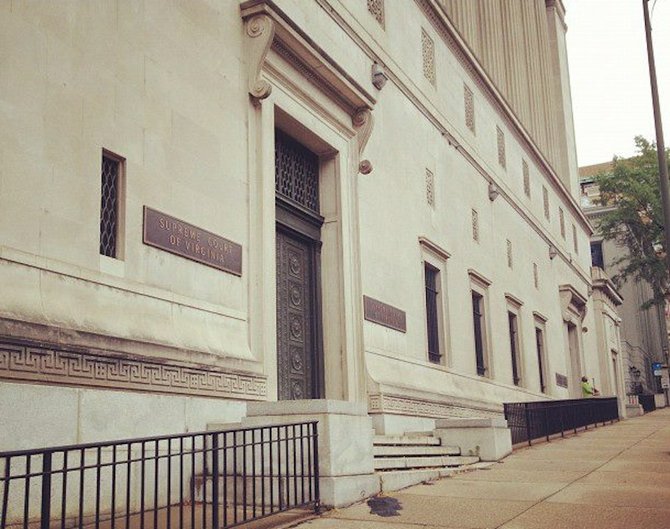No photographs, videos or audio recordings are allowed in the Virginia Supreme Court. Photo by Michael Lee Pope.
The Virginia Supreme Court operates in silence, denying public access to audio recordings of its oral arguments. Unlike the U.S. Supreme Court, which denies video recordings but allows audio recordings, the commonwealth's top appeals court has a complete blackout on public access to proceedings. In a written response to questions from Connection Newspapers, the Office of the Executive Secretary of the Virginia Supreme Court explained that audio records were once public, but the installation of new equipment in January 2008 created new concerns for justices.
"The new digital recording equipment is more sensitive so that the recordings now include any confidential comments any justice makes to another justice during the oral argument," wrote Katya Herndon, director of legislative and public relations for the Office of the Executive Secretary. "Accordingly, the recordings, which are for the internal use of the justices, are no longer made available to the public."
That's unacceptable, according to several advocates for open government and freedom of the press. Virginia Press Association executive director Ginger Stanley said that she would raise the issue next month during a meeting of the Rights and Responsibilities Subcommittee of the Virginia Freedom of Information Advisory Council. During the meeting next month, members will be discussing whether or not to look at parts of government that are not subject to the Virginia Freedom of Information Act, which includes the State Corporation Commission and the Virginia Department of Corrections. Stanley said the August meeting would be an ideal opportunity to challenge the lack of transparency at the Virginia Supreme Court.
"I don't believe that new technology should stand in the way of transparency," said Stanley. "If this is new technology, then it should be able to block the parts that are considered private conversations."
THE LACK OF TRANSPARENCY at the Virginia Supreme Court fits into a pattern of behavior for the commonwealth, which has a reputation for shielding basic information from the public. Last year, the State Integrity Investigation ranked and graded each of the 50 states on government accountability, transparency and corruption. Virginia got an F, largely because police agencies use an exemption clause in the Virginia Freedom of Information Act to withhold basic documents — even in cases that are closed. Now advocates for open government say it's a mistake for the Virginia Supreme Court to operate in secret.
"It just seems unnecessary to allow the justices to make private comments like that that don't serve any function in the hearing and use that as an excuse to keep the entire thing confidential," said Gregg Leslie, legal defense director for the Arlington-based Reporters Committee for Freedom of the Press. "If they really have that concern they need to have better microphones that are off unless the justice pushes a button to turn them on."
Some lawyers see the lack of transparency as a necessary and expected part of the court system.
"If a judge leans over to another judge and says something during the oral argument, to me that's part of the deliberation," said Ed Weiner, a Fairfax County attorney with 33 years of experience. "And I just don't think that the public should be invited into chambers during deliberations."
THE COURT IS AN infamously closed operation. No video records are allowed. No audio recordings are permitted. Visitors to the court are not allowed to enter the building with a cell phone. The court does not even produce transcripts of the oral arguments. Some say the failure to allow public access to audio recordings is a mistake that should either be fixed with some kind of tweak to the recording system or by a new law forcing the courts to allow more sunshine into the dark corridors of power in Richmond.
"The recordings should be made public," said Del. Scott Surovell (D-44). "These cases are some of the most important cases in Virginia, and it's important to have as much sunshine on the public part of that process as possible."
That's a bipartisan view. Courts of Justice Chairman Del. David Albo (R-42) says the Virginia Supreme Court should allow public access to oral arguments or face an effort from the General Assembly to force transparency.
"They are denying the public recordings because they chose crappy technology," said Albo. "I just don't see why they shouldn't give them out. People are allowed to be there. It's a public forum."
More like this story
- Silence of the Court
- Virginia Supreme Court Opens Access to Audio Recordings of Oral Arguments
- Virginia Laws Help Local Governments Conceal 911 Calls from Public
- Virginia Supreme Court Hears Boat Club Case Against City and Restaurant
- Alexandria City Hall Loses Wales Alley Case to Old Dominion Boat Club
